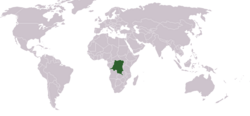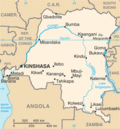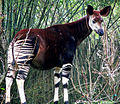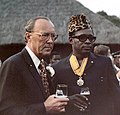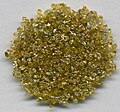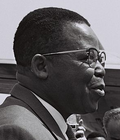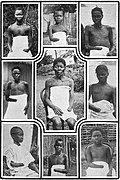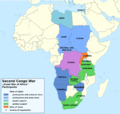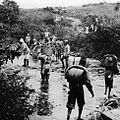Portal:Democratic Republic of the Congo
The Democratic Republic of the Congo Portal
The Democratic Republic of the Congo (DRC), also known as the DR Congo, Congo-Kinshasa, or simply the Congo, is a country in Central Africa. By land area, it is the second-largest country in Africa and the 11th-largest in the world. With a population of around 115 million, the DR Congo is the most populous nominally Francophone country in the world. French is the official and most widely spoken language, though there are over 200 indigenous languages. The national capital and largest city is Kinshasa, which is also the economic center. The country is bordered by the Republic of the Congo, the Cabinda exclave of Angola, and the South Atlantic Ocean to the west; the Central African Republic and South Sudan to the north; Uganda, Rwanda, Burundi, and Tanzania (across Lake Tanganyika) to the east; and Zambia and Angola to the south. Centered on the Congo Basin, most of the country's terrain is covered by dense rainforests and crossed by many rivers, while the east and southeast are mountainous. The territory of the Congo was first inhabited by Central African foragers around 90,000 years ago and was settled in the Bantu expansion about 2,000 to 3,000 years ago. In the west, the Kingdom of Kongo ruled around the mouth of the Congo River from the 14th to the 19th century. In the center and east, the empires of Mwene Muji, Luba, and Lunda ruled between the 15th and 19th centuries. These kingdoms were broken up by Europeans during the colonization of the Congo Basin. King Leopold II of Belgium acquired rights to the Congo territory in 1885 and called it the Congo Free State. In 1908, Leopold ceded the territory after international pressure in response to widespread atrocities, and it became a Belgian colony. Congo achieved independence from Belgium in 1960 and was immediately confronted by a series of secessionist movements, the assassination of Prime Minister Patrice Lumumba, and the seizure of power by Mobutu Sese Seko in 1965. Mobutu renamed the country Zaire in 1971 and imposed a personalist dictatorship. Instability caused by the influx of refugees from the Rwandan Civil War into the eastern part of the country led to the First Congo War from 1996 to 1997, ending in the overthrow of Mobutu. Its name was changed back to the DRC and it was confronted by the Second Congo War from 1998 to 2003, which resulted in the deaths of 5.4 million people and the assassination of President Laurent-Désiré Kabila. The war, widely described as the deadliest conflict since World War II, ended under President Joseph Kabila, who restored relative stability to much of the country, although fighting continued at a lower level mainly in the east. Human rights remained poor, and there were frequent abuses, such as forced disappearances, torture, arbitrary imprisonment and restrictions on civil liberties. Kabila stepped down in 2019, the country's first peaceful transition of power since independence, after Félix Tshisekedi won the highly contentious 2018 general election. Since the early 2000s, there have been over 100 armed groups active in the DRC, mainly concentrated in the Kivu region. One of its largest cities, Goma, was occupied by the March 23 Movement (M23) rebels briefly in 2012 and again in 2025. The M23 uprising escalated in early 2025 after the capture of multiple cities in the east, including with military support from Rwanda, which has caused a conflict between the two countries. Despite being incredibly rich in natural resources, the DRC is one of the poorest countries in the world, having suffered from political instability, a lack of infrastructure, rampant corruption, and centuries of both commercial and colonial extraction and exploitation, followed by more than 60 years of independence, with little widespread development; the nation is a prominent example of the "resource curse". Besides the capital Kinshasa, the two next largest cities, Lubumbashi and Mbuji-Mayi, are both mining communities. The DRC's largest exports are raw minerals and metal, which accounted for 80% of exports in 2023, with China being its largest trade partner. In 2024, DR Congo's level of human development was ranked 180th out of 193 countries by the Human Development Index and it is classified as being one of the least developed countries by the United Nations (UN). As of 2022, following two decades of various civil wars and continued internal conflicts, around one million Congolese refugees were still living in neighbouring countries. Two million children are at risk of starvation, and the fighting has displaced 7.3 million people. The country is a member of the United Nations, Non-Aligned Movement, African Union, COMESA, Southern African Development Community, Organisation Internationale de la Francophonie, and Economic Community of Central African States. (Full article...) Selected article -Patrice Émery Lumumba (/pəˈtriːs lʊˈmʊmbə/ ⓘ pə-TREESS luu-MUUM-bə; born Isaïe Tasumbu Tawosa; 2 July 1925 – 17 January 1961) was a Congolese politician and independence leader who served as the first prime minister of the Democratic Republic of the Congo (then known as the Republic of the Congo) from June until September 1960, following the May 1960 election. He was the leader of the Congolese National Movement (MNC) from 1958 until his assassination in 1961. Ideologically an African nationalist and pan-Africanist, he played a significant role in the transformation of the Congo from a colony of Belgium into an independent republic. Shortly after Congolese independence in June 1960, a mutiny broke out in the army, marking the beginning of the Congo Crisis. After a coup, Lumumba attempted to escape to Stanleyville to join his supporters who had established a new anti-Mobutu state called the Free Republic of the Congo. Lumumba was captured en route by state authorities under Joseph-Désiré Mobutu, sent to the State of Katanga and, with the help of Belgian mercenaries, tortured and executed by the separatist Katangan authorities of Moïse Tshombe. In 2002, Belgium formally apologised for its role in the execution, admitting "moral responsibility", and in 2022, they returned Lumumba’s tooth to his family. He is seen as a martyr for the pan-African movement. (Full article...) General images -The following are images from various Democratic Republic of the Congo-related articles on Wikipedia.
This is a Good article, an article that meets a core set of high editorial standards.
William Henry Sheppard (March 8, 1865 – November 25, 1927) was one of the earliest African Americans to become a missionary for the Presbyterian Church. He spent 20 years in Africa, primarily in and around the Congo Free State, and is best known for his efforts to publicize the atrocities committed against the Kuba and other Congolese peoples by King Leopold II's Force Publique. Sheppard's efforts contributed to the contemporary debate on European colonialism and imperialism in the region, particularly among those of the African-American community. However, it has been noted that he traditionally received little attention in literature on the subject. (Full article...)
This is a Featured article, which represents some of the best content on English Wikipedia..
Jason Sendwe (1917 – 19 June 1964) was a Congolese politician and the founder and leader of the General Association of the Baluba of the Katanga (BALUBAKAT) party. He later served as Second Deputy Prime Minister of the Democratic Republic of the Congo (then Republic of the Congo) from August 1961 until January 1963, and as President of the Province of North Katanga from September 1963 until his death, with a brief interruption. Sendwe was born in 1917 in Mwanya, Kabongo Territory, Belgian Congo, to an ethnic Baluba family. He was educated in Methodist schools and nursing institutions. Unable to become a doctor due to a lack of medical schools in the Congo, he found work as a minister, teacher, and nurse. He became involved in several cultural organisations, and in 1957 founded BALUBAKAT to fight for the interests of the Baluba. He espoused Congolese nationalism and believed that the Congo should remain a united country after Belgian rule. In May 1960, shortly before the country's independence, he was elected to the newly constituted Chamber of Deputies. Sendwe sought to obtain control over the government of Katanga Province, but lost to a power struggle against his rival, Moïse Tshombe, and the Confederation of Tribal Associations of Katanga (CONAKAT) party. Regardless, Prime Minister Patrice Lumumba nominated him for the office of State Commissioner for Katanga. (Full article...)
WikiProjectsTopicsCategoriesRelated portalsAssociated WikimediaThe following Wikimedia Foundation sister projects provide more on this subject:
Discover Wikipedia using portals | ||||||||



